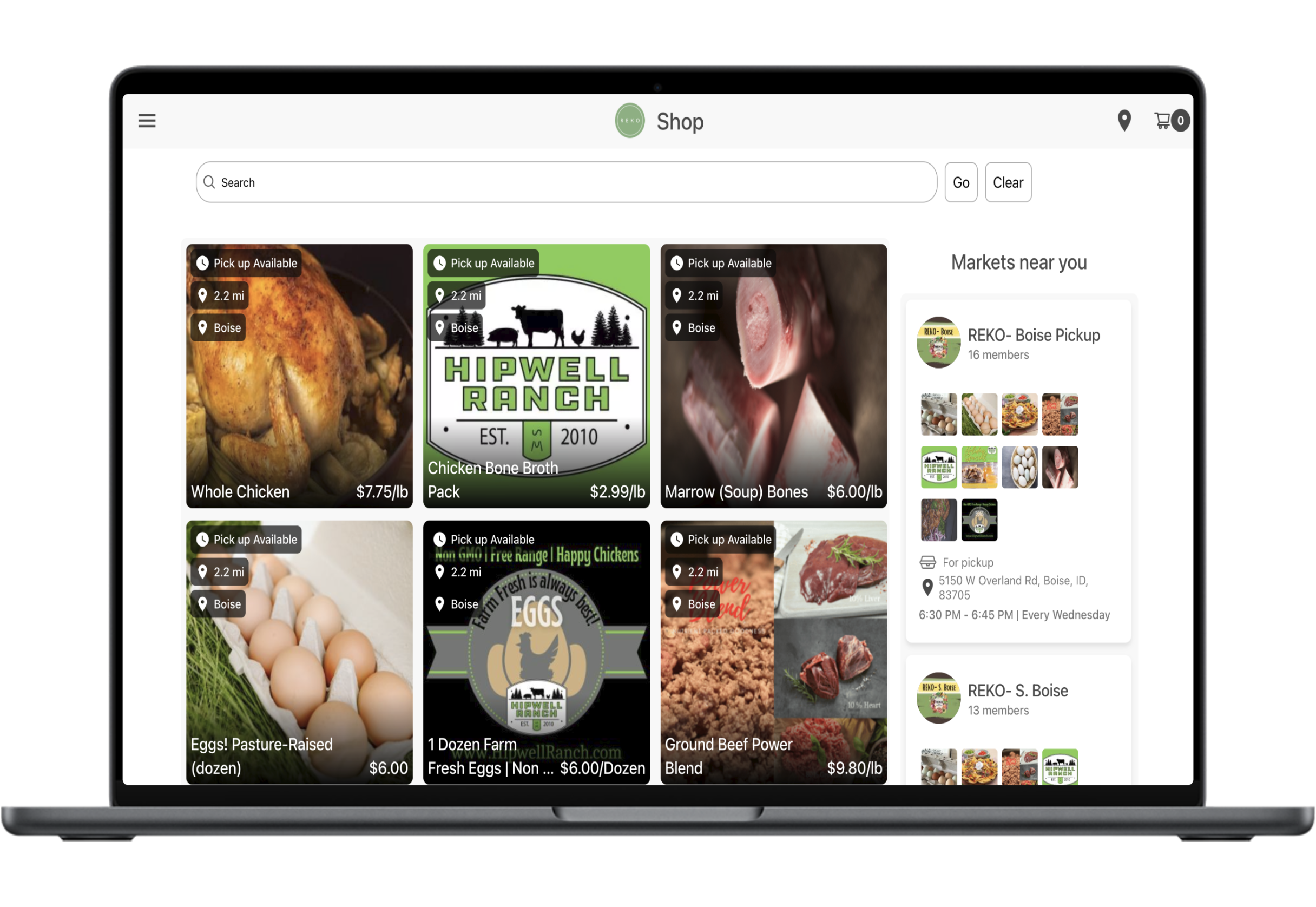What Is The US Farm Trail Project?
We are on a mission to localize food again.
Currently, there is over $1,000,000,000,000 (trillion) spent on food each year in the United States. However, only 0.4% of that is spent on locally produced food from local farmers. That needs to change.
Local food is better for our health, better for the environment, and better for our local economies. It's time to support our local farmers and develop self-reliant food supply chains in our local communities.
Buying local makes it easier for you to know that you are protecting your family by providing them with the best foods that are free from things like artificial flavorings, preservatives, GMOs, mRNA injected cows, etc.
It's time to buy local, directly from farmers you know and trust.
The U.S. Farm Trail Project is a nationwide initiative designed to connect consumers with local farms and producers. Our goal is to support local agriculture by providing a platform where people can easily find and buy fresh, locally produced food. We believe that by promoting local farms, we can improve community health, protect the environment, and strengthen local economies.
To help accomplish this, we are building the U.S. Farm Trail maps with the help of locals all around the United States. We have also partnered with RekoHub.com to help make it easier for people to shop directly from local farmers in their area.
How Can I Help?
There are many ways you can support the U.S. Farm Trail Project:
- Check www.RekoHub.com to see what local food is available in your area.
- Spread the word about the importance of buying local and share our website with friends and family.
- Share our website with your local farmers and ask them to submit their informaiton so we can add them to the maps.
- Use our homeschool curriculum, developed by our brand sponsor and partner One Room Schoolhouse, to help educate your kids and students on the importance of buying local.
Homeschool Curriculum
Our homeschool curriculum is designed to educate students about local agriculture and the importance of sustainable farming practices. The curriculum includes lesson plans, activities, and field trip ideas that align with state educational standards. By integrating agricultural education into your homeschool program, you can help students develop a deeper understanding of where their food comes from and the benefits of supporting local farms.
Why More People Are Buying Local Now
Health
Environment
Economy
Community
There are lots of reasons to buy local.
Learn more about how locally produced food is better for your health, the environment, the economy, and our communities by clicking on an image above.
Health

Local food is better for our health because it doesn't have pesticides, herbicides, or hormones, and it is additive and preservative-free. Freshly harvested produce retains more nutrients compared to food that has traveled long distances and been stored for extended periods. By choosing local, you're also reducing your exposure to potentially harmful chemicals and supporting farming practices that prioritize sustainability and human health. Local farms often grow a diverse range of crops, which can lead to a more varied and balanced diet for consumers.
Local food systems also encourage seasonal eating, which means you consume produce when it's at its peak in terms of flavor and nutrition. Seasonal eating can also align with the body's natural nutritional needs throughout the year, promoting better overall health. Furthermore, local food producers are often more transparent about their farming practices, allowing consumers to make more informed decisions about what they eat.
Eating locally grown food can also contribute to better mental health. The act of visiting farmers' markets, interacting with growers, and participating in community-supported agriculture (CSA) programs can enhance social connections and foster a sense of community. These activities provide an opportunity to engage with others, learn about food production, and feel more connected to the food we eat.
In addition, supporting local food systems can help preserve traditional farming practices and heirloom varieties of fruits and vegetables, which are often more nutritious than their mass-produced counterparts. By choosing local, you are contributing to the preservation of biodiversity and the promotion of agricultural practices that are beneficial for human health and the environment. Overall, local food systems offer numerous health benefits that go beyond just the nutritional value of the food itself.
Environment

Regenerative farming has positive impacts on the environment compared to big ag monocrop farming. Local farms often use methods that improve soil health, increase biodiversity, and reduce the need for chemical fertilizers and pesticides. Additionally, buying local reduces the carbon footprint associated with food transportation, known as food miles. Supporting local agriculture helps maintain green spaces and wildlife habitats, contributing to a healthier planet. Local farms also tend to use more sustainable water management practices, reducing the strain on local water resources.
Local food systems promote crop diversity, which is crucial for maintaining healthy ecosystems. Diverse crops can support a wider range of wildlife, including pollinators such as bees and butterflies, which are essential for the reproduction of many plants. By supporting local farms, consumers are indirectly contributing to the preservation of these important species and the overall health of the environment.
Furthermore, local farms often engage in practices that sequester carbon, such as cover cropping and reduced tillage. These practices help to mitigate climate change by capturing and storing carbon dioxide in the soil. Healthy soils not only store more carbon but also retain more water, making them more resilient to extreme weather events such as droughts and floods.
Local food systems also reduce the need for extensive packaging and refrigeration, which are energy-intensive processes. By purchasing food that is grown closer to home, consumers can reduce their energy consumption and the associated greenhouse gas emissions. Overall, supporting local agriculture is a proactive way to contribute to environmental sustainability and combat climate change.
Economy

Keeping money within a local economy helps bolster it during times of economic uncertainty and makes it more inflation-resistant. Local farms create jobs and support other local businesses, such as equipment suppliers and markets. By buying local, you're investing in your community's economic resilience and helping to create a robust, interconnected local economy that can better withstand external shocks. Local food systems also encourage entrepreneurship and innovation, as farmers experiment with new crops and sustainable practices.
Local agriculture provides opportunities for economic diversification, which is essential for the long-term stability of rural communities. By supporting a variety of agricultural enterprises, consumers help to create a more resilient local economy that is less dependent on a single industry. This diversification can lead to the development of new markets and products, further strengthening the local economy.
When you buy local, more of your money stays in the community, circulating through local businesses and generating additional economic activity. This multiplier effect helps to create a vibrant local economy, with more job opportunities and higher incomes for residents. Additionally, local farms often collaborate with other local businesses, such as restaurants and grocery stores, creating a network of economic relationships that benefit the entire community.
Supporting local agriculture also helps to preserve farmland and rural landscapes, which can be important for tourism and recreation. By maintaining these areas, communities can attract visitors and generate additional revenue through activities such as agritourism and farmers' markets. Overall, a strong local food system can be a key driver of economic development and prosperity in rural areas.
Community

Buying local helps bolster the food supply chain and makes local communities more independent and self-reliant. Local farms build connections between consumers and producers, fostering a sense of community and trust. When you buy directly from a farmer, you're supporting local families and ensuring that your community has access to fresh, healthy food. This localized food system can be more adaptable and responsive to the needs of the community. Local food systems also create opportunities for community engagement and education, as people learn about where their food comes from and how it is produced.
Local food systems can enhance social cohesion by bringing people together through farmers' markets, community-supported agriculture (CSA) programs, and food festivals. These events provide a platform for people to interact, share knowledge, and build relationships, strengthening the social fabric of the community. By participating in these activities, individuals can develop a deeper appreciation for local food and the people who produce it.
Supporting local agriculture also helps to preserve cultural heritage and traditions. Many local farms grow heirloom varieties of fruits and vegetables, which are often associated with specific regions and cultural practices. By choosing local, consumers can help to keep these traditions alive and ensure that they are passed down to future generations. Additionally, local food systems can promote food sovereignty, allowing communities to have greater control over their food supply and production methods.
Local food systems can also play a crucial role in addressing food insecurity. By ensuring that fresh, healthy food is available within the community, local farms can help to reduce reliance on external food sources and improve food access for all residents. Community-based food programs, such as food co-ops and urban gardens, can further enhance food security and provide opportunities for community members to participate in food production. Overall, local food systems contribute to the resilience and well-being of the community, fostering a sense of connection and shared purpose.
Contact Us
If you have any questions about the U.S. Farm Trail Project, or if you'd like to get involved, please don't hesitate to reach out to us. You can contact us via email at eatlocal@usfarmtrail.com or fill out the contact form below:
One Room Schoolhouse

One Room Schoolhouse is a homeschool family and they also have a podcast, Dwell in the House of the Lord. They are dedicated to providing a unique and enriching education experience for children.
Visit Sponsor's SiteRekoHub


